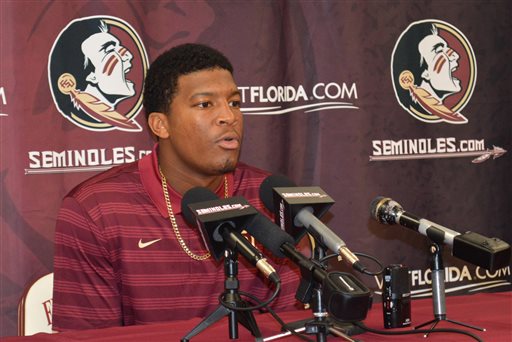When it comes to Autographgate, which Heisman Trophy hopeful is next? Mississippi State quarterback Dak Prescott? Notre Dame QB Everett Golson? The Aflac duck?
Just as the stench from Georgia running back (and former Heisman favorite) Todd Gurley's indefinite suspension for allegedly accepting money for autographing everything from jerseys to photos was starting to fade, news arrived Monday evening that similar accusations are now being aimed at reigning Heisman winner and Florida State redshirt sophomore quarterback Jameis Winston.
Scandal and Winston long ago grew as inseparable as smoke and fire. In fact, not 45 minutes after ESPN.com reported that he was being investigated for more than 300 autographs that appear to have been signed at the same sitting, the website also reported that one of three retired Florida Supreme Court justices will serve as the independent official in Winston's upcoming hearing concerning whether he violated the school's conduct code during an alleged sexual assault in December 2012.
(Side note: Winston and his accuser will each strike one of the former justices. If they choose the same one, the school will pick between the other two. The three in question reportedly include Major Harding, a former chief justice of the court who graduated from Wake Forest, then Virginia law school; Joseph Hackett, Florida's first black justice; and Charles Wells, a University of Florida alumnus who presided over the 2000 presidential election cases involving hanging chads. Think there's any way Winston puts his fate in the hands of a Gator?)
But perhaps we digress from Autographgate and what to do to avoid such future messes.
This is not to forgive Gurley an ounce of responsibility in this matter. He was 1,000 percent wrong to sell his autograph, if that is what he truly did.
There should be no misunderstanding of that portion of the NCAA's draconian rules book, however much Georgia athletes -- are you listening, A.J. Green? -- have somehow struggled to understand that in the past.
No matter how talented you are, no matter how much the public wants to pay for a commemorative piece of that talent, no matter how much you may richly deserve some sort of compensation for that talent being realized, you ... just ... can't ... cave in to the desire to earn money from that talent until you have run out of NCAA eligibility. At least not yet.
So whatever is written beyond this point in today's column, please don't email me later that I fail to understand the difference between right and wrong within the narrow-minded confines of the NCAA rules book, because I do.
Gurley was wrong.
Gurley was wrong.
Gurley was ... (sorry, our newspaper's dwindling space doesn't allow me to type those three words 100 times before moving on).
But that doesn't mean the system is right, or that some swift changes don't need to be implemented, though asking the NCAA to move swiftly would be like asking Gurley to run slowly. It's probably not happening.
Still, the NCAA needs to try to develop guidelines by which gifted athletes such as Gurley can make whatever deals possible that are commensurate with the marketplace. Earnings could be capped at $10,000 per year. A large portion -- say 75 percent -- could even be put into a trust, payable when the player graduates.
There also needs to be an independent committee to carefully study each case, to make sure this isn't merely a rogue booster paying the player money for work not done, such as the old joke that Johnny Superstar's summer job was to mow and water the artificial turf. Make sure the money produced a product.
And not to play the race card here, but this must also be considered: In eligibility issues of this kind, black America can point to Green, Dez Bryant and possibly Gurley as examples where the NCAA came down hard, whether fair or not.
But when it involved Texas A&M's rebel without pause last year -- then reigning Heisman Trophy winner Johnny Manziel -- a one-half game suspension was handed down.
The NCAA said it had no credible evidence that Manziel had been paid for his signature, despite literally thousands of authenticated Manziel autographs clogging the Internet rather than the 500 or so in the Gurley case, or the 300 or so regarding Winston.
CBS also was kicking off its national coverage with Alabama at A&M, which fell before Manziel could have concluded a four-game suspension. If Johnny Football didn't play, CBS could expect public access channel ratings. Because he did, Bama-A&M trailed only Alabama-Auburn for highest regular-season viewership in 2013.
Point is, the country club kid Manziel missed one-half of one game. Gurley's college career could be over, and possibly Winston's, though that could be viewed as a lifetime achievement award, given his checkered past.
But what looks the worst is that Manziel may have delivered the most sensible reason to inject free enterprise into college athletics.
Noted the Cleveland Browns rookie QB last week: "I obviously know what Todd's going through right now, and I feel for him. He's built somewhat of a brand for himself, and I feel like he should be able to capitalize off it.''
Yes, Gurley was wrong. But the NCAA is wrong, too. If ever two wrongs needed to pave the way for a right, Autographgate would seem to be it.
Contact Mark Wiedmer at mwiedmer@timesfreepress.com.

